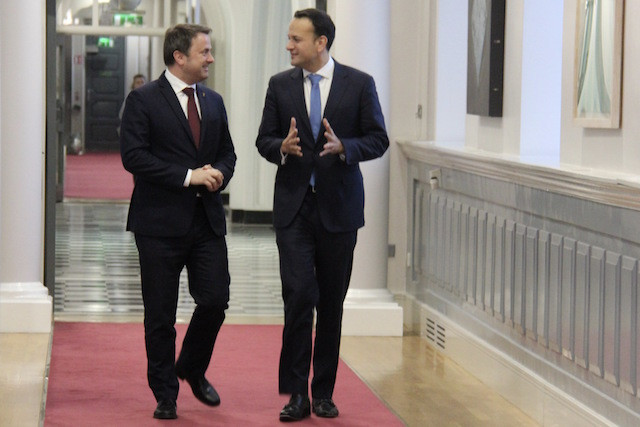US-Canada border not example for Ireland: taoiseach
Ireland’s prime minister, Leo Varadkar, has rejected the example of the US-Canada border as a possible model for the Ireland-Northern Ireland frontier after Britain quits the EU, reported Reuters. On Monday, the British prime minister, Theresa May, had said arrangements between the US and Canada were among those the UK would study. However, “That is definitely not a solution that we can possibly entertain,” said Varadkar, speaking at a press conference in Dublin with Xavier Bettel, Luxembourg’s prime minister. Bettel said Luxembourg and Ireland needed to stand together, and called on London to provide more specific details on its post-Brexit plans. Reuters quoted Bettel as saying of Britain: “When they were in [the EU], they wanted to have a lot of opt outs, now that they are out, they want a lot of opts ins... I believe we need solutions because the time is ticking.”
Talks hit turbulence
Aviation negotiations between the UK and US over post-Brexit transatlantic flights broke down in January “after US negotiators offered only a standard bilateral agreement,” reported the Financial Times. “You can’t just scratch out ‘EU’ and put in ‘UK’,” said one official quoted by the paper. The EU and US have one of the most liberal “open skies” treaties in the world, the FT noted. American negotiators are apparently driving a hard bargain over national ownership rules; the big 3 British carrier groups have major foreign shareholders, which would introduce limitations under the “standard” deal. UK-US flights represent about a third of transatlantic traffic, the FT said.
Steeling for impact
The impact on ArcelorMittal of 25% tariffs on steel imports into the US, ordered by Donald Trump last week, remains unclear. Moody’s, the credit ratings agency, said in a report on 2 March that the tariffs would have a negative impact on European steelmakers as a whole. However, Moody’s noted that steel production in the US accounted for about 21% of ArcelorMittal’s total revenue last year, and “Their US operations will start to benefit from the expected rise in steel prices once the tariff is in place.” But Bank of America Merrill Lynch, an investment bank, downgraded ArcelorMittal shares, from “buy” to “neutral”, saying the tariffs will have limited benefit due to long-term contracts. The bank expects steel prices to drop following challenges to the World Trade Organization.
Shadow banking in Luxembourg: $3.2trn
Luxembourg investment funds have been added to the Financial Stability Board’s annual report on “shadow banking”, activity which includes bank-like lending by non-banks. That helped shadow banking grow by more than 8% globally to $45trn, according to the Financial Times. The FSB, an international policy-setting body, says that collective investment vehicles (such as Ucits funds that form the backbone of Luxembourg’s funds sector) are “susceptible to runs by investors” as the FT put it.
Dieschbourg supports Vienna in anti-nuclear case
Luxembourg is backing Austria in a challenge against the European Commission’s approval of an expansion of Hungary’s Paks nuclear facility. In January, Austria filed a case against the commission in the European Court of Justice. During a meeting in Brussels on Monday, Carole Dieschbourg, Luxembourg’s Green party environment minister, said they wanted to “end the renaissance of nuclear energy”, as reported by EUobserver. Dieschbourg said Luxembourg would host a summit of German-speaking environment ministers “this summer” on building an anti-nuclear alliance.
